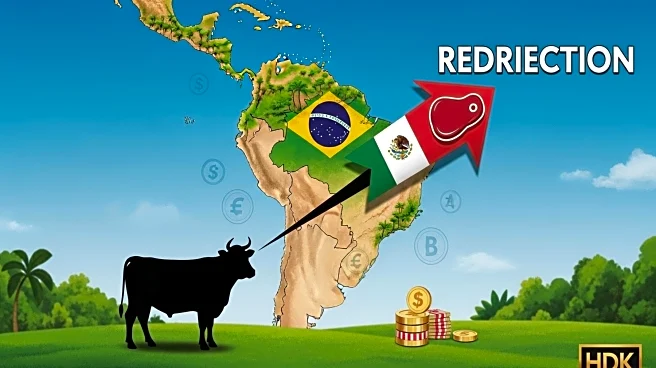What is the story about?
What's Happening?
In 2025, Brazil faced a significant tariff crisis when the U.S. imposed a 76.4% effective tariff on Brazilian beef exports. This included a new 50% levy added by the Trump administration on top of an existing 26.4% tax. As a result, Brazil redirected its beef exports to Mexico, which became its second-largest market. By July 2025, Brazil's beef exports to Mexico surged by 420% year-to-date, reaching 67,659 metric tons, tripling the volume from 2024. Mexico's strategic advantages, such as proximity, low logistics costs, and integration under the USMCA framework, positioned it as a critical buffer for Brazil. Brazil is seeking approval for additional meatpacking plants to export to Mexico, potentially increasing authorized facilities to 49. A five-year cooperation pact between Brazil and Mexico further solidifies this partnership, covering animal health, food safety, and agricultural technology.
Why It's Important?
The tariff crisis highlights the importance of diversification in global trade, especially for meat exporters. Brazil's strategic pivot to Mexico demonstrates how geopolitical risks can reshape market access and supply chain resilience. The crisis underscores the need for exporters to balance short-term market access with long-term geopolitical stability. Brazil's ability to adapt by expanding certification capacity, securing new trade agreements, and leveraging Mexico's infrastructure showcases strategic foresight in mitigating trade disruptions. The U.S. remains a critical market for Brazil, and the government has hinted at legal challenges to the tariffs' legality. However, the broader takeaway is clear: diversification is not just a contingency plan but a core strategy in a fragmented global trade landscape.
What's Next?
Brazil is negotiating a free trade agreement with Mexico and exploring renewed terms for the 'Package Against Inflation and High Prices,' which temporarily suspends tariffs on essential goods. These moves reflect a calculated shift toward reducing dependency on any single market. Brazil is also targeting China and Southeast Asia, where U.S.-China trade tensions have created openings. China’s retaliatory tariffs on U.S. agribusiness products have disrupted $23.7 billion in 2024 exports, allowing Brazil and Argentina to capture market share. Geopolitical risks remain pervasive, with tariff hikes disproportionately affecting pork and beef exports globally.
Beyond the Headlines
The crisis highlights the importance of supply chain agility for investors. Brazil's ability to adapt by expanding certification capacity, securing new trade agreements, and leveraging Mexico's infrastructure demonstrates how strategic foresight can mitigate trade disruptions. The broader takeaway is clear: in a fragmented global trade landscape, diversification is not just a contingency plan but a core strategy. For meat exporters, the 2025 crisis highlights the need to balance short-term market access with long-term geopolitical stability.















